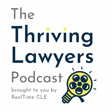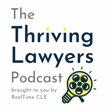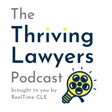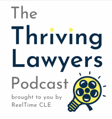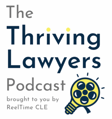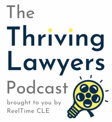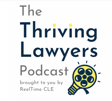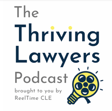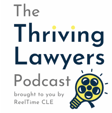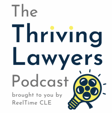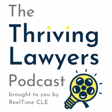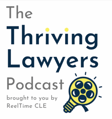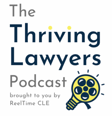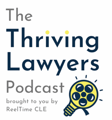Introduction and Absence of Co-host
00:00:01
Speaker
Hey there, folks, and welcome to another episode of the Thriving Lawyers Podcast. My name is Chris Osborne, and I am one of the hosts of podcasts. My colleague and co-conspirator, Michael Kahn, is not with us for this particular episode, but he will be back, you can be sure, with a great, interesting interview sometime coming up.
Guest Introduction: Coleman Cowan
00:00:23
Speaker
Today is my privilege to have a guest I'm super excited about. He is a lawyer who practices in Durham, North Carolina, named Coleman Cowan. And some of you may already be familiar with him or know him. He's practiced law for a while, but he's he's also under a
00:00:38
Speaker
a few different turns and twists in his career when he wasn't practicing law. And he's gonna talk with us some about that today. And we're excited about the kinds of things that he might be able to shed some light on from having been in the law, outside the law, and then back inside the law again.
Coleman's Background and Law Practice
00:00:57
Speaker
So welcome Coleman. Coleman, just say a bit about yourself and kind of your family and where you practice and what you do, and then we'll kind of get into the interview.
00:01:05
Speaker
Thanks, Chris. I appreciate you having me on. As you said, I'm a trial lawyer, James Cotton Farron, I practice in Durham and in Raleigh. My wife, Angie, and my 11-year-old son, Julian, we live in Raleigh. Been back here for about three and a half years after a little bit of an adventure in New York City that I think we're going to talk about today, but glad to be here. I appreciate you having me on.
Rekindling Childhood Friendship
00:01:31
Speaker
Well, I'm excited to have you on and this is a special episode, especially because Coleman and I actually knew each other from about I think was second grade. I moved to Greensboro. I had lived in Charlotte and my dad got a job with Burlington Industries that took us up to this.
00:01:47
Speaker
crazy town of Greensboro that I had not really even heard of or been to before. And we had the good fortune to move in across the street from Coleman and his family. This would have been 1977, I believe, right around in there. And we ended up, you know, across the street, neighbors, friends, playing soccer together. Coleman went on to an illustrious soccer career. I went on to South Georgia where
00:02:09
Speaker
Nobody really understood soccer or knew what it was. But but did get to play some down there. And then we just recently we run into each other over the years every now and then. We were both at Chapel Hill around the same time, kind of running different circles. And then we recently reconnected through some work we'll talk about with NCBA committee called the Professional Vitality Committee. And that that's sort of one of the things we saw, we had some similar purposes and interests.
00:02:35
Speaker
And it's been fun to reconnect and kind of see where life has taken us, and particularly since we both care about this idea of thriving. We're folks who have had different kinds of influences and interests that we've managed to figure out something to do with those, either in law or out of law. And so we hope this will be a fun conversation. I guess I want to start, Coleman.
00:03:01
Speaker
What was my recollection of, you know, I remember, you know, I spent a lot of time, I think, over here at your house. In fact, I was remembering recently, this is an odd non sequitur. I may have to edit this out, but had an occasion recently to talk with somebody about the Dukes of Hazzard TV show. And I remember where I was when I saw my first Dukes of Hazzard commercial for that show. I was in your living room, actually.
00:03:25
Speaker
And I saw this commercial with the General Lee jump, and they're like, oh, the dukes of hazard. And I'm like, that looks so cool. I want to watch that. My parents were like, oh, I don't know about that. That's kind of grown up. But I remember exactly seeing that, that it was so compelling to a seven-year-old kid, like, wow. But your dad was a well-known lawyer, Don Cowan, and just a great
Influence of Coleman's Father on His Career
00:03:49
Speaker
a giant of a man really uh as i came back into north carolina many years later and started practicing just so many people had so much respect for him uh both for his career as a litigation attorney i know he's with smith helms and helms mullis through all those iterations but also and i think ellison winners may be late in his career but he was also famous for having um uh worked on some uh
00:04:11
Speaker
death penalty cases on a pro bono basis and just a giant of a man. Tell us just a little bit about kind of, I know you lost him not too long ago, but just what was that like having a dad who was a lawyer? Did it inspire you? Did you want to be a lawyer or did you, some people like say, no, I don't want to do what dad does, but what was that like for you and what's it been like for you to practice, you know, now that he's not there? The short answer to those questions is yes and no.
00:04:41
Speaker
It's kind of interesting how all that worked out. Loved my dad to death, respected him. He was a fantastic dad. And one of the things that I remember most vividly about him and that I try to recreate myself now that I'm a dad is that no matter how busy he got,
00:05:02
Speaker
with his practice, trying cases all across the state and all across the country. He was always there at every soccer practice, every soccer game.
00:05:12
Speaker
every once I got into band and was doing other things he was always there and as a kid as a teenager I didn't necessarily understand or I didn't really appreciate that as much as I do now but sure how lucky I was to grow up with that was yeah yeah I don't know how hard that was that was not just easy
00:05:34
Speaker
Right. But to answer your question, as I was growing up and I think through being a kid, a teenager, probably until I was 22 years old, the last thing I wanted to be was a lawyer. And it's because I didn't understand, frankly, in hindsight, I didn't understand what being a lawyer was. I saw my dad put on a suit, go to work.
00:05:59
Speaker
I knew he sat at a desk in an office and worked in an office building that I saw a lot on the weekends when I would go in with him when he was working. And that's what I thought it was. And I thought that's the last thing I want to do is sit at a desk in an office and an office tower day in and day out, week in and week out. But once I became aware of what he actually did, that it wasn't sitting at a desk, that it was trying cases, that it was helping people, it was working on these
00:06:28
Speaker
pro bono death row cases, helping people that needed help. Once I understood those things, then that's when I realized, oh, this is something that I'm interested in and I do want to see if I can do this. So it went from being the last thing that I wanted to do to the only thing that I wanted to do. And it was just getting an understanding of what it was and what my dad actually did and understanding him as
00:06:56
Speaker
a professional and somebody other than this is the wonderful person that is my dad. Yeah, you kind of had to have, I guess, a more developed frontal lobe. You know, it's been shocking to me to learn how late it, you know, the brain actually matures. But we have to actually have that awareness and desire sort of understand the adult world, I think. That's right. But as I think we'll talk about there, there are still some remnants of that me wanting to do some other things that
00:07:25
Speaker
where I realized while I was lurking in the back of my mind that were brought to the front of my mind by a couple of experiences that I had. And I know we'll talk about that. Certainly. And so before law made the list and became the thing that you did want to do, what else was on the list? What else? When you finished Chapel Hill in 1992, same year I did, what did you look at doing? What did you think about doing? What was, you know,
00:07:51
Speaker
Or did you, and did you go straight to law school? I can't remember.
Coleman's Journey in Law School and Career Choices
00:07:53
Speaker
Did you go straight through or did you have a little time in between? I went straight through to law school and I'll tell you what I tell a lot of people. Little known fact about me is that I started college as a music major. I played guitar, learned how to play piano, and that's what I wanted to do. That changed midway through college when my music professor said,
00:08:19
Speaker
In order to do this, this is all you can do. You have to immerse yourself in this and ignore everything else. I was ready to immerse myself. I wasn't ready to ignore everything else. And then I just started exploring other things. And that's when, I think fortunately for me, I became more curious about what my dad did and started having conversations with him about his practice, about his cases and what he actually did beyond just sitting at a desk in an office.
00:08:49
Speaker
Sure. So you went to Wake Forest and I remember I think I knew some people either that knew you there and that's when we started to kind of reconnect. I have an image of actually maybe it was bar prep like we were there was a bar prep recording or something that was a Wake Forest professor. I'm like that's calling on there or something but um so how did you decide what kind of law you wanted to practice then coming out and and what'd you do? Well it was
00:09:17
Speaker
part of the way that I grew up in my conversations with my dad and I guess part of my just.
00:09:23
Speaker
being a little bit naive. When I thought about being a lawyer, I thought about what do lawyers do? Well, they try cases. Obviously, there are so many things you can do with a law degree beyond that, but that's what I knew, and I knew that from my dad. And so when I decided to go to law school, that's what I thought I wanted to do. And as I started taking classes, I just gravitated towards the trial advocacy classes, the evidence classes, the civil procedure, criminal procedure.
00:09:52
Speaker
And that's, that's what I enjoyed. And that's what I thrived in doing. And, you know, again, that's what I thought lawyers did. So that's what I wanted to do. And that's what I did when I got out of law school, clerked for a judge for a year, was fortunate to have that experience in the middle district of North Carolina, clerking for a wonderful judge, Judge Tilly, and then moved into a trial practice. Okay. And who'd you start with? Who would you work with? What firm?
00:10:23
Speaker
I started with what was then Womble, Carlisle, Sandridge, and Rice in Raleigh. They're now through a couple of mergers, I think, Womble, Bond, Dickinson. But started with this big prestigious southeastern regional firm. And that's what I came to know and learned how to bill hours and build my time and keep up with my cases and manage cases. I learned
00:10:53
Speaker
that, well, I realized I wasn't getting the trial experience that I thought that I would get. And my dad and he would tell me stories about picking up a file Monday morning, you know, this is in the late 70s, early 80s and picking up two files and walk into the courthouse with another lawyer in his firm. And they would say, which one do you want? Well, I'll take this when you take the other one. And they sit down, read the file and go pick a jury. And like, my God, I can't imagine doing that today.
00:11:23
Speaker
But that's what they were doing and they had fun doing it and got a lot of really good trial experience. One of the things that I learned early on when I started practicing law was that that's not the way things are done today. You're not trying cases. Very few cases are being tried. More is at stake. And I realized early on that what I need to do is I basically forced a lot of my cases to go to trial because I realized I wasn't getting that trial experience.
00:11:52
Speaker
And within my practice group in the first couple of years, I think I tried a handful of cases and I was one of the only lawyers in my group that was actually going to trial just because the cases weren't going to trial. And I became more interested in trying cases than what I realized my practice could have been headed towards and that is case management.
00:12:21
Speaker
Uh, so I, after about four years, uh, practicing at Wamba Carlisle, uh, I got an opportunity to switch sides from the defense to, uh, go to a plaintiff's firm, uh, Martin and Jones and Raleigh and try cases, which, uh, was a wonderful experience. I mean, when I started at Wamba Carlisle, I was at a great job with great firm, very stable, secure. I was doing well. And I thought this is where I'm going to be for the rest of my life.
00:12:50
Speaker
Then an opportunity came along that maybe sort of look at other things and realize, oh, well, maybe I will do something different. And, you know, frankly, when I went to Martin and Jones, I was with a good firm working with good lawyers, trying good cases, stable job, good career. And there were parts of it that I enjoyed and I thought this is where I'm going to be for the rest of my life. And then, you know, as you know, as we'll talk about a couple of things happened that made me look at some other things and pursue some other things.
00:13:20
Speaker
Yeah, and I want to just underscore first a couple things. One, just you're hitting on the difference between a trial lawyer versus kind of a litigator or a litigation manager. I don't think I came out of law school with as much of an appreciation for that either. You kind of thought it's trial work, it's litigation is all setting up trial work.
00:13:42
Speaker
But there's no way to know that 90 plus percent of cases actually settle. It was kind of eye-opening to me. I actually started with an insurance defense practice that I'd found in Charlotte, kind of a smaller firm. And I wasn't quite as bad as, you know, here, take this file, go try it tomorrow.
00:13:59
Speaker
but i did have a lot of a pretty decent caseload and i was trying cases in district court and superior court you know as a really young lawyer i look back now and think oh my gosh let me do that but it's definitely i think i interned actually i spent a summer in the charlotte office of wamble and
00:14:18
Speaker
and got a taste of sort of what litigation on that scale is like. And I still have friends who are there in the Charlotte office that I really like a lot and a lot of friends in the larger firms. And I know for me, just kind of being one of them five, six lawyers on a team or some kind of big,
00:14:36
Speaker
you know it's important good litigation uh and and yet it's not the same as kind of being in charge of managing the case and getting it start to finish um but so you have alluded to though i i know from some writing you've done i think that's where you came back kind of my on my radar uh somebody had heard about a particular incident that happened to you and i can't remember if it was while you were clerking or after
00:14:59
Speaker
But talk about kind of a very, there was a formative incident that sort of impacted your life and your job satisfaction, kind of set the stage of which of those career stops you were at and how that happened and sort of what the impact of that was on your career decisions.
Life-changing Mugging Incident
00:15:19
Speaker
This was 1999, February 24th, 1999.
00:15:24
Speaker
I had been practicing, I'd been out of law school for four years and had been in private practice for three of those years after my clerkship. And a couple of things happened. This event, I walked into a deposition and I remember sitting in the parking lot before going into this doctor's deposition and I'd just come to a realization that
00:15:54
Speaker
All this hard work that I was putting in, that I thought was going to get me ahead and reduce the stress that I had that was just an inherent part of my practice. And I know this is nothing unique to me. But I thought, I've come to realize that no matter how hard I work, that work isn't going away and that stress isn't going away. Hard work just meant that there would be more work waiting for me.
00:16:22
Speaker
And I was back to the realization that there's, I'm always going to be climbing that mountain. I'm never going to get over it. And so I go into this deposition, we take the doctor's deposition, and afterwards I'm speaking with the other attorney in the parking lots of this doctor's office in Durham on Roxborough road. It's a little bit after seven o'clock in the middle of the week in February, so it's dark.
00:16:51
Speaker
Basically, what happens is a kid comes up on a bike with a gun and mugs us. He doesn't really mug us before he starts shooting us. He shot the other lawyer through the abdomen. He shot me through my arm and just an incredible story. Obviously, it's not good that this happened, but it's wonderful the way things worked out.
00:17:14
Speaker
The bullet that went through my arm just shattered my arm But it went into this huge file folder that I was carrying, you know at the time you
00:17:23
Speaker
carrying paper copies of paper exhibits and being a young lawyer, I had the whole case with me. And so the bullet goes through my arm, into the folder, fortunately stops. It's a, as I later learn, a hollow point bullet. So it expands as it goes through everything. Oh my gosh. And so it stops before it gets to my hip, which allows me to run away, which
00:17:46
Speaker
As I learned later, probably not only saved my life, but saved the other lawyer's life because the young kid with the gun basically emptied his clip trying to hit me again. Fortunately, he left the other lawyer there, probably thought he was dead as I did. He wasn't. Once I made it to the hospital, I was there for four nights. The other lawyer was there for seven.
00:18:15
Speaker
He is alive and well and practicing in North Carolina doing well As I am alive and well and practicing in North Carolina as well But Coleman I had I had not heard the part of that story about the file folder That is sort of just that is hitting my head all different kinds of ways I'm thinking you know having carried those binders around and
00:18:39
Speaker
like, good thing that we didn't have, you didn't have a rolly case, you know, and it wasn't down by your side. I'm also thinking, man, that's a great advertisement for not going paperless, I suppose, saved by the paper in that case. But wow. The Red Well is being bulletproof. But yeah, that's what saved me and, and frankly, saved the other lawyer too, I think.
00:19:02
Speaker
Wow. So, so, and you were already kind of having this, I don't know if I like this sort of hamster wheel sort of feeling of, you know, where am I, where's this going? How is this end? Is it more of this? And I'm not sure I'm good with that. What, you know, what was rehab like from that? What was it like to have that kind of interruption to your young developing career? Um, you know, the immediate sort of,
00:19:29
Speaker
emotion or sensation that I went through after that was, was fear. I'd been a victim and you know, I always consider myself and do consider myself a pretty strong and resilient person. Yeah. But I remember in the months after that, being very fearful, being fearful that this guy was still out there, my name was in the paper, you can find where I am and
00:19:55
Speaker
I was fearful even once I got back into practice, traveling, being in crowds around among like large, large number of people. Yeah. Because I thought to myself, this happened. It's kind of silly to think about it this way. But the way I thought about it was this happened because I saw a little kid roll up to us on a bike and I wasn't paying attention to where his hands were. I wasn't thinking about, well, this is what he could do. And for.
00:20:22
Speaker
a number of years and it's been over 20 years. I still do this to a certain extent when I'm on the street, I'm watching where people's hands are just because you don't know. So the immediate sort of sensation and emotion that I went through was fear and sort of dealing with being in crowds and around people that you don't know and you don't know what they're going to do and anybody can do anything. And I worked myself through that and got back into my practice.
00:20:53
Speaker
And all that same stress was still there and all that same work was still there. And it made me realize it sounds kind of corny, but it made me realize the reality of the cliche that tomorrow might not come. And so it became very important to me to do things right today and not put things off. And I think those became the seeds for
00:21:21
Speaker
what eventually led me to leave my law practice and pursue something completely different that I had no background in that I thought would just be an exciting adventure. And thank God it turned out that it was. Yeah. Well, let me ask you a question. So the shooting though happened while you were still at Womble. Is that right?
00:21:44
Speaker
Okay. And so then you did make a career change after that, or at least a professional change to go and do trial work at Martin and Jones.
Transition to Journalism and New Beginnings
00:21:54
Speaker
So how long were you there?
00:21:56
Speaker
And did you think at some point that shifting sides and getting more towards the courtroom was gonna make things better enough, sustainable enough? Or was it already kind of nagging at you that you might need to do completely something different? How did that process, I guess, play out? The way it worked out is this experience, I think, turned me on to the idea that I don't necessarily have to be on this track. I've always thought
00:22:24
Speaker
This is the firm I'm going to be with for the rest of my career. And this experience made me realize, just forced me to open my eyes to different experiences. So that made me open to this opportunity that presented itself to change sides from the defense to the plaintiff's side. That was a good move. I was working with good lawyers, trying good cases, and I was in court.
00:22:53
Speaker
Getting good results and doing good things for my clients and learning a lot along the way. So it was a great experience. It was a good change, but What I realized over a number of years is this this thing was growing inside me and I didn't know what it was at the time but it kind of came back to this realization that you know tomorrow not might not come so let's get today, right and if
00:23:18
Speaker
You have this idea of, wouldn't it be great to do this or exciting to do this? Well, why put it off? Why think one day this might be something fun to do or exciting to do? Let's do it now. And so I had this idea. And what I realized was this dream to become a writer and become a journalist. And what I realized was that was grounded in just
00:23:46
Speaker
Need for more adventure in my life. I wasn't married at the time I Didn't have a lot. I didn't have a huge law school debt and I was at a point in my life where I could do something like this and That really the decision came down to me realizing I didn't want to be whatever 50 60 years old 70 looking back on I
00:24:13
Speaker
my life and my career and think, I wish I had done this. I wish I had tried this when it's too late. And so I was in my mid thirties and I decided, you know what, I can do this now and I might fail spectacularly, but I want to know how this turns out. Uh, so with, so what did it look like? What, what, what would you actually practically do then? I, I told, uh, I told my partners, Martin Jones that I was leaving.
00:24:42
Speaker
And the question was, well, where are you going? What firm poached you? And I said, nobody. I did. I'm leaving to go become a journalist. And Jaws dropped. And people told me I was crazy, making a foolish decision, as did lots of my friends. But the one person who didn't say that, who didn't react that way, was my dad. Wow. He was as excited about this
00:25:11
Speaker
this change as I was. And this wasn't like I was leaving something going into a new opportunity that had presented itself. It was, I just decided I wanted more adventure and the way to do that was to become a journalist. And I had no background, no connections, no resources. I just, I had a dream and I decided that this is something I
00:25:39
Speaker
want and need to pursue and need to do it now. And what had you, you talked about starting as a music major, what had you changed your major to before going to law school? I become an economics major. Okay, so it wasn't journalism. It wasn't journalism. And you know, Carolina has a fantastic journalism school. Yeah, I hadn't even written for, you know, my student
00:26:07
Speaker
paper in high school or junior high. I've done nothing. I had this dream that I wanted to be Tom Wolfe. I wanted to be a journalist. I wanted to write for Rolling Stone and then I wanted to write nonfiction and then I wanted to write fiction. I had it all laid out. Yes. I had a dream. And so how did the dream actually start when you had to, you know, the no and I'm moving on was one thing. Where did you end up and what was that like?
00:26:37
Speaker
I started out, I talked my way into a very entry level position at Businessweek magazine in their Atlanta bureau.
Covering Hurricane Katrina: A Career-defining Moment
00:26:47
Speaker
And so I tell people I went from trying cases, handing out seven figure checks to my clients to
00:26:57
Speaker
working for $9 an hour, setting up the fax machine, making coffee, and listening to the bureau chief talk about things like Burger King stock and Circuit City. And it was just a real, it was a real world realization about like, and forced me to confront, do I really want to do this? Now, fortunately for me, while this was happening, they also gave me a little bit of leeway to write some stories.
00:27:27
Speaker
This was 2005 and they sent me to New Orleans right after Hurricane Katrina. And I remember being there and I remember being in the Lower Ninth Ward and I was doing a story on the school system and how they were reconstructing and rebuilding the school system after Katrina had come through and just decimated the whole city and the school system.
00:27:53
Speaker
I remember walking around the Lower Ninth Ward and walking in and out of these schools and how incredible it was to be there then and think, this is my job. Somebody's paying me to be here to do this, to have this experience and write about this. And that was just a fantastic realization.
00:28:16
Speaker
that's what told me that I was doing something right and this crazy decision that everybody said was foolish maybe wasn't actually that foolish. That led me to...
00:28:31
Speaker
Before you go on, let me just underscore, I love that because it's one of the things that in my workshops I like to talk about with lawyers is it's okay, and in fact, it's a good thing to have that sort of passion connection, to have that sort of belief that your work is meaningful. And I think it can be too easy for us as lawyers to sometimes
00:28:53
Speaker
settle for not having that. You know what I'm saying? Like, oh, it pays the bills or I'm good at it. But it doesn't necessarily spark, you know, it doesn't connect with us on a deeper level. I know I felt that some in my first job doing insurance defense and trying cases got to where I could depose a medical expert or chiropractor in my sleep. That's like, okay, but is this it? Is this kind of all I'm going to do with my time?
00:29:18
Speaker
And there's something to be said for, you got into a place where you felt the meaning and the bigger picture, but also the meaning for you
Finding Meaning in Journalism vs. Law
00:29:29
Speaker
of it. It was soul nourishing, almost, is the word I would use, which is powerful, I would say. And the thing that I think is important for our listeners is,
00:29:40
Speaker
if you have that soul nourishing and that sense of meaning, you can endure some pretty crappy external circumstances, you know, getting paid nine bucks an hour and, you know, being the grunt isn't that bad if you're getting these, you know, intangible benefits in a way. I think that's exactly right. And I had a certain element of that, you know, is this it? And, you know,
00:30:05
Speaker
I had that experience in New Orleans and I had many experiences like that once I got to 60 minutes all over the world that, you know, this is exciting and I can't believe I'm getting paid to do this. And it was finding that inspiration and that feeling, which I've fortunately been able to find now that I've been back, but that was missing before I left. And a lot of what I experienced and what I learned
00:30:33
Speaker
when I left has helped me now that I've come back.
Conclusion and Teaser for Next Episode
00:30:36
Speaker
Well, and what I'm going to do is I'm going to kind of make a bookmark pause here because we're almost at 30 minutes. My guess is this is where we'll end episode one, because this is going to be definitely a two parter because we've got so much more good stuff to talk about. So for the sake of our editing folks, we'll wrap part one here and tune in next week to hear part two of my interview with Coleman Cowan, where you hear more of the adventure and also more of what happened that brought him back to practicing law.
00:31:06
Speaker
With us down here in North Carolina again, so we'll pick it back up next week I Could slate it I would Press while we're doing this one of my ear pods is Losing battery, so I'm gonna switch and hope that doesn't create an audio issue. No worries. Perfect timing. All right
00:31:36
Speaker
You got a backup set. You have a backup set. Is that a different set of EarPods?

